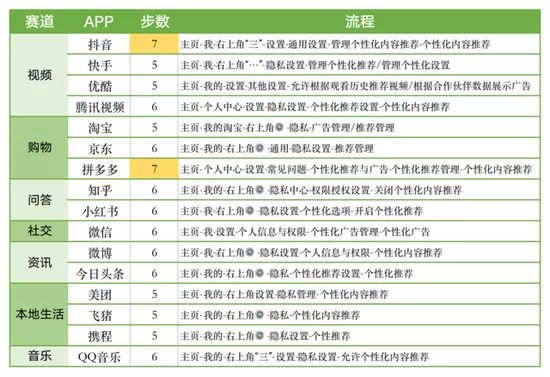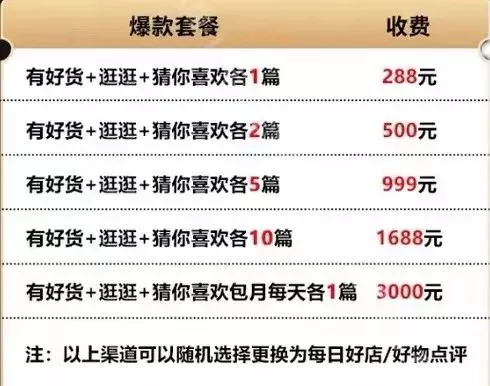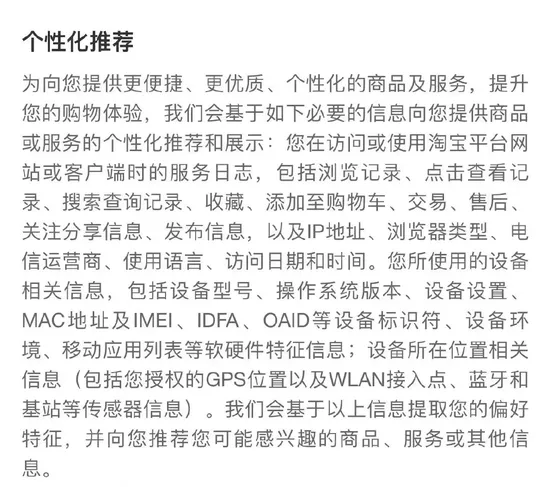"We have a greater impact on your life than you think. We will tell you where your home is, where you are at school, decide whether you can get a loan to buy your dream car, tell you when the bus will come, and what friends you should know, even boyfriends or girlfriends... We call algorithm, and we are everywhere."
In the documentary "algorithm: how to dominate the human world", the power of "algorithm" is presented in the first person. In daily life, we are more or less dominated by algorithms. A typical one is the recommendation algorithm.
More and more accurate recommendation algorithms have become an important "weapon" of major Internet platforms. It seems that every minute is competing for who can "guess you like" faster. Especially in Taobao, idle fish and other e-commerce platforms, it directly takes "guess what you like" as the main section recommended by the home page. Personalized recommendation imperceptibly changes users' consumption habits, but also changes businesses' marketing strategies.
However, just like Pandora's magic box, when major platforms rely more and more on algorithms, personalized recommendation algorithms are gradually breaking the boundaries, which also raises concerns about the abuse of algorithms by regulators and users.
After the official implementation of the regulations on the administration of Internet information service algorithm recommendation on March 1, 2022, Taobao, Tiktok, Kwai, pinduoduo, xiaohongshu, Weibo and other head platforms involving algorithm recommendation allow users to "turn off personalized recommendation with one click". It seems that this gives users the opportunity to turn off the "magic box". However, it is not so easy to escape the domination of the algorithm.
When the algorithm is "addicted": users who are "domesticated"
"I can finally end this feeling of being watched!" After discovering that many software, including Taobao, could turn off "personalized recommendation", Shasha, 27, immediately turned on the software and turned it off one by one, "the days of no privacy and information explosion are finally over".
For a long time, Shasha was distressed by the personalized recommendation of e-commerce platforms. The initial distress comes from the growing desire to consume. "Sometimes you just occasionally mention a small thing with your best friend or boyfriend, such as praising that the skirt your best friend wears is beautiful, or asking your boyfriend to take a bottle of soda from the fridge. As a result, you will soon see all kinds of skirts pushed by Taobao, or drinks of different flavors and brands." Sasha opened it casually, looked at it and placed an order. "It unconsciously increased your purchase rate. For example, when you just bought a cup, Taobao seemed to be asking you, do you want to buy another 123456?"
If the desire to consume can at least be controlled by himself, the "I know you best" presented by a large number of home page recommendation information makes Shasha think more and fear.
"I always suspect that I have been monitored by these shopping platforms. Obviously, I haven't searched any keywords at all. I just mentioned that I can see the recommended related things when I open Taobao." The most exaggerated one was that Sasha said to her dog at home that she touched the dog's head several times. "In the evening, I took a look at the home page of Taobao and pushed me a dog's head doll and dog's head cover."
There are many people like Shasha who want to get rid of algorithm recommendation. According to a survey of 1144 respondents conducted by the joint questionnaire network of the social survey center of China Youth Daily, 53.8% of the respondents said they would choose to turn off the algorithm recommendation function. They hope that the regulations can curb the unhealthy tendencies of inducing excessive consumption (68.2%), big data ripening (61.9%), inducing addiction (57.5%) and excessive collection of personal information (46.0%).
In the process of turning off personalized recommendation, Shasha felt annoyed several times, because this setting requires a lot of steps, "obviously, the platform doesn't want you to turn off smoothly". According to media estimates, the operation of closing personalized content recommendation given by the platform is between 5-7 steps, which is cumbersome. If the user doesn't deliberately turn it off, personalized recommendation will be turned on by default, and there will be no update prompt for the user. "I've also specifically looked for detailed steps and strategies, one by one. If you're impatient, you may give up."

Steps for closing personalized recommendation of major software. Source: Leopard transformation
Therefore, after closing the personalized recommendation of many software, Shasha was relieved.
However, what made her feel helpless was that two days later, she opened the personalized recommendation again. "You think the world is quiet after you turn off the personalized recommendation, but in fact it is more like being polluted. Without the personalized recommendation, you make random recommendations and stuff a pile of things that have nothing to do with my life with the original information flow."
In fact, there are not many users like Shasha. On various platforms such as Weibo and xiaohongshu, we found that many netizens said, "I closed Taobao's personalized recommendation in the morning and opened it again in the evening", "I realized that either I can only guess you like it or I can directly put it bad", "people who are used to personalized recommendation still think they can get rid of it?"
The other side of the "magic box" that is difficult to close is that in addition to those forced to reopen algorithm recommendations such as Sasha, many users have been "domesticated" by personalized algorithm recommendations and are difficult to leave this "information cocoon room".
"Although it is true that we sometimes feel monitored, the content of personalized recommendation is really accurate. If we quickly obtain the content we like, screen out the things we like, and give up privacy, it is the price we must pay as users, and we may only accept it." Milly, who worked in an Internet company, was also a programmer. She knew that the user information mastered by the Internet platform was far beyond the imagination of users, but she didn't choose to turn off personalized recommendation. "After all, do you think you can escape the algorithm by turning off personalized recommendation?"
When I first saw the algorithm: all the "sweets" were priced
To talk about how the recommendation algorithm "domesticates" users step by step, let's turn back the time and return to the time when we first saw the algorithm.
As written by Caijing Tianxia, the recommendation algorithm first came into the public view. It began with the main product today's headlines. It was launched in August 2012. As the first news and information app in China that takes machine recommendation as the main distribution method, today's headlines swept 10 million users in just 90 days, and brought the concept of "recommendation algorithm" to fire in China for the first time.
Since then, from information platform to short video platform, more and more Internet companies have seen the power of "recommendation algorithm". The e-commerce platform led by Taobao relies on the recommendation algorithm step by step.
Take Taobao as an example, search the previously public information and sort out its personalized algorithm recommendation changes. As early as 2013, Taobao launched a ranking algorithm - "thousands of people and thousands of faces", which relies on Taobao's database to capture promotional products with characteristics matching user interest points from subdivided categories.
On November 11, 2015, Taobao adopted personalized recommendation on a large scale for the first time, and 2 / 3 of the transaction volume of 91.2 billion yuan on that day occurred on mobile phones. In March 2017, Taobao added the "guess what you like" module for the first time. At that time, there was a word washing button in the lower left corner of the hand washing home page. Click in to guess the entrance you like.
Since around 2018, Taobao has officially realized the importance of personalized recommendation. At Alibaba 2018 global investor conference, Taobao President Jiang Fan introduced the progress and achievements of Taobao's content strategy to investors, and focused on the reform of mobile Taobao home page information flow, including the comprehensive upgrading of recommendation algorithm. After double 11 in the same year, Jiang Fan said that the traffic brought by personalized recommendation has exceeded the traffic brought by search. After the revision of hand Amoy that year, "guess what you like" with personalized recommendation as the core jumped from the seventh screen to the second screen.
Two years later, according to latepost, on the eve of double 11 in 2020, "mobile Taobao will usher in a major revision again: the mobile Taobao home page will fully stream information, and the original prominent focus map display advertisement at the top will be changed into a vertical version and moved to the first position of the algorithm recommendation information flow at the bottom of the page. After the revision, the information flow 'guess you like' will become the protagonist of Taobao's first screen."
When the e-commerce platform built its own recommendation algorithm Empire step by step, users didn't realize that it was a double-edged sword at first, and even felt that they had tasted the sweetness.
You know, at present, Shasha, who is very tired of algorithm recommendation, once relied on it. "In fact, I didn't realize what was behind this recommendation at the beginning, and the algorithm at that time may not be so out of control now. As a user, I simply think it's more convenient to buy something, because after you search for something, it may recommend many similar things to you, so you can compare them faster."
On major social platforms, there are also voices such as "Taobao guess I like it, I really like it", "personalized recommendation really understands me".
This sweetness is actually "inducing" businesses to change their marketing strategies. Zinc scale found that on many platforms, there are strategies for businesses to enter Taobao's "guess you like" traffic pool, and even an industrial chain to ensure that they can pass the material audit.
The customer service of a related enterprise told zinc scale that they are mainly responsible for Taobao to guess the content contribution recommended by the talent you like, and guide consumers to enter the store and transform through content exposure, but there is no guarantee that they can go to the home page, "because there are thousands of people and thousands of faces on the home page, we just ensure that the review is passed, and the display on the home page is randomly arranged by Taobao system." The price of such a content contribution is 100 yuan. The customer service told zinc scale, "many businesses buy multiple items at one time and arrange one item a week".

Quotation of relevant contents
Some stores have also launched related packages. The package price of one of them is good goods + shopping + guess you like one article each, and the price is 288 yuan; There are good goods + shopping + guess you like two articles, the price is 500 yuan: one article per month per day, the price is 3000 yuan. As for Taobao, I guess you like the short video of the plate. Ensure that the price on the home page is 800 yuan.
In addition to Taobao, platforms such as Tiktok store and xiaohongshu also have relevant industrial chains or tutorials, claiming that "core operations will explode in a month, and the maintenance will continue to be profitable in the later period."
For the platform, it is the beneficiary of the algorithm. Harvard Business Review once reported that in terms of marketing, personalization of user experience can increase the return on investment by five to eight times and increase sales by more than 10%.
Therefore, the sweetness that "shashas" tasted from personalized recommendation has already secretly marked the price.
Under the siege: why put the algorithm in a cage
"Look at the data used in Taobao's personalized recommendation. What data can be used indicates what data can be collected. It's a pity that this technology doesn't do Skynet." When a netizen tried to turn off Taobao's personalized recommendation, according to Taobao's reminder, he saw that his personalized recommendation will be based on the following necessary information: the service log when you visit or use Taobao platform website or client, including browsing records, click to view records, search query records, collection, add to shopping cart, transaction, after-sales, follow and share information, publish information, as well as IP address, browser type Telecom operator... Information about the equipment you use, including equipment model, operating system version, equipment settings, equipment environment, etc.

In fact, Taobao is just an algorithm led by the besieged e-commerce platform.
Whether it is video software, Q & a social software, various information software, or even music software, the tentacles of algorithms are extending into all aspects of people's life. As "Caijing Tianxia" wrote, even those Internet companies that do not take algorithms as their strengths have mostly launched recommendation systems on the home page of mobile terminals. For example, iqiyi and BiliBili home pages have a "recommendation" column, and Youku home page has a "guess you're chasing".
With the algorithm siege built step by step, the potential risks are gradually emerging.
Chen Qianling, a special commentator on e-Law of Caijing, once pointed out in his article that fairness and justice are the universal values pursued by mankind, but in the world of algorithms, the primary pursuit is efficiency. The essence of algorithms is a problem-solving tool to seek "optimal solutions". Especially when their designers and users are enterprises, they often take the maximization of commercial interests as the primary goal. Therefore, in the world dominated by algorithmic power, people are no longer rich individuals with complex connotation, but "particle people" accumulated by digital fragments. With the goal of maximizing personal utility, they have become the object defined, classified, rated and used.
Fortunately, at least change has begun to happen. On March 1, 2022, the regulations on the administration of Internet information service algorithm recommendation jointly issued by the Ministry of industry and information technology, the Internet information office and other departments officially came into force, which is a precedent for opening the algorithm specification all over the world.
A variety of software also launched the "personal information collection list", and users can view the specific personal information collected and the number of times collected. Some software gives the option of "clear personalized record", which can clear the user's previous historical behavior with one click. For example, Weibo has specially issued a document to explain the formation mechanism of search heat, discussion heat and dissemination heat, and byte runout has also specially explained the principle of recommendation algorithm.
However, in order to really put the algorithm in the "cage", we also need various Internet platforms to make the tentacles of the algorithm more limited, more rationally weigh the interests of commercialization and the rights and interests of users, and truly return the option to users. After all, only by keeping the boundary, the algorithm will not be separated from the scope of tools.